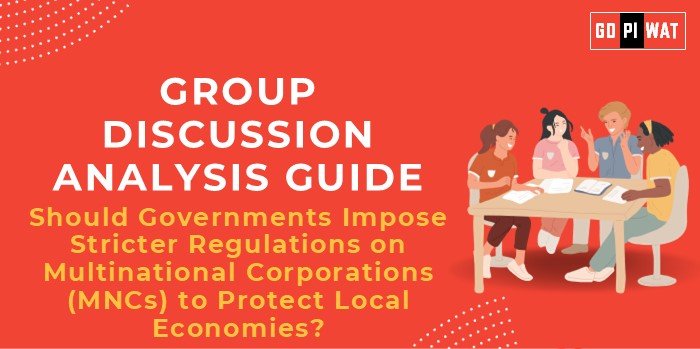📋 Group Discussion (GD) Analysis Guide: Should Governments Impose Stricter Regulations on Multinational Corporations (MNCs) to Protect Local Economies?
🌍 Introduction to the Topic
- 💡 Opening Context: Multinational corporations drive global trade and innovation but often raise concerns about their influence on local economies, particularly regarding competition, labor rights, and resource allocation.
- 📜 Topic Background: This debate stems from decades of globalization, where MNCs have shaped economic policies worldwide. While they bring investment and job opportunities, they can also undercut local businesses, exploit natural resources, and evade taxation through complex structures. Countries like India, Brazil, and South Africa have debated stricter regulations to safeguard domestic interests.
📊 Quick Facts and Key Statistics
- 🌍 MNC Investments: FDI inflows to developing economies reached $650 billion in 2022, with 40% attributed to MNCs (UNCTAD).
- 💰 Tax Avoidance: MNC profit-shifting results in global tax revenue losses of $245 billion annually (OECD).
- 🏪 Local Businesses: 90% of MSMEs in emerging markets struggle to compete with MNCs due to lower production costs and economies of scale (World Bank).
- ⚖️ Labor Concerns: Over 30% of MNC employees in developing nations face inadequate labor protections (ILO).
👥 Stakeholders and Their Roles
- 🏛️ Governments: Create regulations to balance foreign investment and domestic growth.
- 🏢 MNCs: Bring investment, innovation, and global best practices but must adhere to local laws.
- 🏪 Local Businesses: Often compete with MNCs, advocating for fair trade policies.
- 🌱 Civil Societies: Monitor and advocate for labor rights, environmental sustainability, and equitable resource usage.
🏆 Achievements and ⚠️ Challenges
Achievements:
- ✅ MNC-led FDI: Improved infrastructure and generated employment in developing nations like Vietnam and Mexico.
- 🚀 Advanced Technology: Introduction of advanced technology and management practices.
- 🌐 Global Trade Networks: Strengthened international trade and cooperation.
Challenges:
- ⚠️ Profit Repatriation: Limits reinvestment in host countries.
- 🏪 Local Business Survival: Threatened by resource monopolization by MNCs.
- 📉 Regulatory Loopholes: Result in tax avoidance and lost revenue.
Global Comparisons:
- 🇨🇳 China: Leveraged MNC investments for tech transfer while maintaining regulatory oversight.
- 🇧🇩 Bangladesh: Reliant on MNCs in the garment sector but struggling with fair wages and labor protections.
Case Study:
- 🇮🇳 India’s E-commerce Sector: Dominated by MNCs like Amazon and Walmart, leading to regulatory interventions to protect local sellers.
📋 Structured Arguments for Discussion
- 📈 Supporting Stance: Stricter regulations ensure fair competition, protect local industries, and prevent exploitation.
- 📉 Opposing Stance: Overregulation could deter foreign investments, stifling innovation and economic growth.
- ⚖️ Balanced Perspective: A nuanced approach with targeted regulations balancing growth and protection is optimal.
💡 Effective Discussion Approaches
- 📊 Opening Approaches:
- 💬 “Over $240 billion in tax revenue is lost globally to MNCs. Shouldn’t governments enforce stricter policies?”
- 🌍 “MNC investments boost economies but often undermine local businesses. How do we strike a balance?”
- 🔍 Counter-Argument Handling: Cite examples like China’s tech sector, which has thrived under balanced MNC regulations.
🔍 Strategic Analysis of Strengths and Weaknesses
- ✨ Strengths: Attracting capital and technology, creating jobs.
- ⚠️ Weaknesses: Tax evasion, anti-competitive practices.
- 🚀 Opportunities: Strengthening MSMEs through public-private partnerships (PPPs).
- ⛔ Threats: Overdependence on MNCs, resource depletion.
📘 Connecting with B-School Applications
- 📚 Real-World Applications: Relevant to case studies in international business, trade policies, and ethical business practices.
- 💬 Sample Interview Questions:
- 🔎 “What regulatory frameworks should governments adopt to manage MNCs?”
- 🔎 “Discuss the impact of MNCs on local economies using examples.”
- ✨ Insights for Students:
- 📊 Explore how ethical regulations align with sustainable development goals.
- 🌐 Analyze the economic interdependence between MNCs and local economies.


